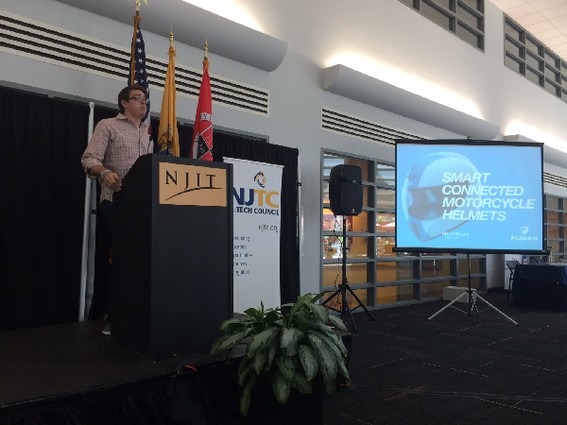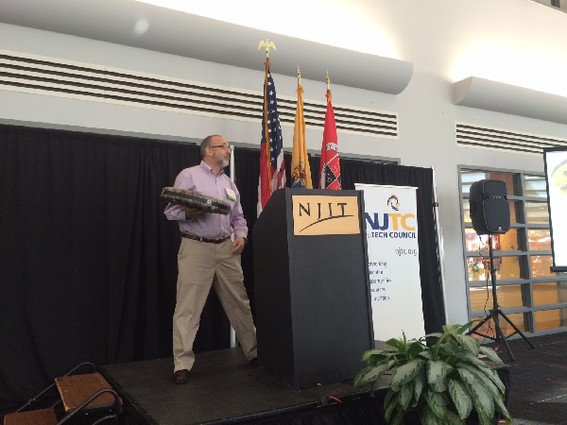Some NJTC Internet of Things Competition Winners from New Jersey

The May 7 Internet of Things Conference, presented by the New Jersey Technology Council at New Jersey Institute of Technology (Newark), featured a competition among companies that are incorporating sensors into their products, creating wearables, developing bots or drones and developing apps that are changing how people interact with the things in their lives.
NJTC received many entries for its competition, and selected 16 companies to present in front of the conference. Four company winners and four student winners were selected and awarded certificates.
The company winners were:
Sensors Category
- Kentix US (NJ office in Landing, product developed in Germany)
Tanja Lewit, managing director, discussed Kentix’s “really cool” one-stop solution for physical threats to data farms and data centers. The one-box multi-sensor technology mitigates problems caused by temperature, humidity, dew point, motion, sabotage, power loss, or “you name it,” Lewit said. “More than 50 percent of IT losses are caused by physical threats,” she told the audience. The company has a phone app that indicates when something is out of order. “The idea is that you no longer need separate systems for burglary or fire detection,” Lewit said. In addition, the device integrates into a company’s own software-detection systems and infrastructure system software.
Wearables Category

- Fusar Technologies (Jersey City)
FUSAR, originally a TechLaunch company, has widened its focus, according to cofounder and CFO Clayton Patton. He said that the company creates wearable technologies for action sports, and added, “What we are developing is a widely scalable computer platform that has been designed for integration in the helmet form factor.” Patton noted that the company was founded by CEO Ryan Shearman, who is a passionate motorcyclist, and that the entire startup team is made up of passionate motorcyclists who have set out to solve a real problem: how to make motorcycling less dangerous.
Further, the company intends to change helmet technology, which has remained unchanged for many decades, he said. “We want to transform the industry from passive safety to active safety.” Patton added the company has come up with the term “breaking the ride,” which happens when a motorcyclist has to pull over and take his or her phone out to look at the GPS or take a photo. Fusar’s technology makes it possible to avoid this. For example, Patton explained, “We’ve created a seamless user interface that allows you, by simply hitting a trigger on your handlebars, to take a picture.” Fusar has also developed an eyes-up display that doesn’t require the user to take his or her eyes off the road, he said. [Since the event, TechLaunch reported that Fusar has closed a Seed Series B/SeedInvest round, raised in collaboration with Jumpstart New Jersey Angel Network and SeedInvest. ]
Bots/Drone Category

- General Airbotics (Colmar, Pa.)
General Airbotics has been in business for about two years, according to founder Jeffrey Smith, who added that his 10-person startup is working on a drone called “Sparrow” to deal with safety issues that are plaguing the drone industry. “This is a relatively complicated problem and it’s not a trivial one,” he told the group. “We built out these people-friendly flying robots. The robot has to be able to get up close to people and property” At the start, the company threw out the notion of joystick or toggle controls, deciding instead to control the drone through pointing, since humans innately know how to point. The company then redesigned the entire drone from the ground up. “One of the major problems has to do with exposed blades … a lot of products tried to put up blade guards, but you really need something that will have the blades imbedded in. … We had to do custom electronics and invent new soft and flexible materials.” Sensors embedded around the outside of the drone will keep it from touching a person or building, he said.
Apps Category

- Vognition (Newark)
Vognition is a B2B company providing a natural-language voice-control platform for connected devices within the IoT and smart-hub space, said founder and CEO Michael Liguori. “What makes us special is we provide the leading-edge intellectual property as a single package for our customers. This way they are able to manage it themselves using our services.” Vognition, which is based at the NJIT Enterprise Development Center, provides its smart microphone button within the customers’ app, so users can talk naturally to their devices without having to learn how to use that interface. Liguori mentioned that Vognition was in a consumer trial in the home automation space, and that he had demoed at the 2015 Consumer Electronics Show with Nexia Home Intelligence. Vognition’s natural-language interface lets users say something as unintuitive as “kill the kitchen lights,” he said. Customers get a natural-language voice-control tool kit, and they can maintain the same voice user experience across all their mobile platforms. They can also mimic all their touch screen actions with voice, he said.

